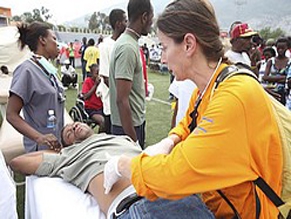|
World Jewish News

Israeli medical personnel treat an injured man in a
Port-au-Prince soccer stadium where the IDF field hospital
is operating (photo by JPost.com).
|
IDF Home Front chief heads to Haiti with reinforcements
19.01.2010, Israel and the World OC Home Front Command Maj.-Gen. Yair Golan left Monday night to head a second IDF delegation to assist the ongoing relief efforts in Haiti, and will deliver staff reinforcements and additional medicine and equipment to the field hospital in Port-au-Prince.
The IDF team includes IDF Surgeon General Brig.-Gen. Nachman Ash.
Health Ministry Director-General Dr. Eitan Hai-Am also left for Port-au-Prince on Monday night to monitor the supply needs of the medical teams. He was accompanied by Dr. Danny Laor, director of the ministry's emergency division.
Since opening its doors on Saturday, the 121-person IDF Medical Corps team at the hospital have treated 200 wounded, performed 25 life-saving surgeries and facilitated three births. The large field hospital and community clinic is located in a soccer stadium in the center of town.
They have been joined by professionals of IsraAID/FIRST, which has been operating in Port-au-Prince for the last five days. On Monday, nine volunteers from Los Angeles joined the Israeli delegation in the field hospital.
Two rescue crews led by the commanders of the Home Front Command Search and Rescue Unit are also operating in the disaster-stricken area in cooperation with the local residents.
Over 2,000 desperate people have come to the stadium hospital for help.
"The situation is horrible. There is no doctor in sight. People are hungry and wounded. There are constant waves of injured people coming to the stadium," said Alan Schneider, a delegation member.
Due to the growing need for assistance, IsraAID/FIRST will be sending an additional team of 12 medical and logistical staff over the coming weekend.
Medical and other urgent supplies will be purchased by IsraAID in the Dominican Republic, and some of the items arriving from the US will be used as well.
IsraAID's emergency response is supported through the donations of the UJA Federation of Greater Toronto, the American Jewish Committee, B'nai B'rith International, the Jewish federations of metropolitan Chicago, Los Angeles, Cleveland and San Francisco, in addition to other federations in North America.
A Magen David Adom team of paramedics left for Haiti on Monday morning and landed in the Dominican Republic for transfer to nearby Haiti. As MDA is a member of the International Red Cross Movement, the Israeli team will work in cooperation with the Norwegian Red Cross, which is planning to open a field hospital there to augment the IDF facility.
Team head Haim Rachlevsky said the paramedics underwent special training for coping with a large number of wounded and sick.
Brig.-Gen. Shalom Ben-Aryeh, commander of the IDF delegation in Haiti told reporters by phone on Monday that it was unlikely that search-and-rescue teams would find anymore survivors under the rubble.
"Since there is no longer a real chance to find survivors, we are moving to the second stage of the plan which is to study and learn from what happened in Haiti," he said.
He said the delegation was closely following the United Nations work at establishing a tent city on the island, since it Israel may well have to do the same if it is struck by a massive earthquake in the future.
The International Diabetes Federation and the Insulin for Life voluntary organization have launched an effort to help the 300,000 Haitians who suffer from diabetes and need insulin injections. The diabetes clinic in Port-au-Prince, which has not yet collapsed, will serve as the location for distributing insulin and blood test sticks for glucose.
It would be terrible if Haitians who survived the earthquake were to die for lack of insulin, the federation said. "Already, this disaster ranks among the most devastating and logistically challenging in recent history. We are seeing the difficulties that arise when disaster strikes an already disastrous public health situation," Dr. Margaret Chan, the head of the World Health Organization, reported on Monday to the WHO executive board in Geneva.
Many of the problems the WHO tries to prevent after a disaster, such as diseases associated with poor water and sanitation systems, low immunization coverage, widespread malnutrition, outbreaks of infectious diseases, a high prevalence of HIV/AIDS and tuberculosis and erratic delivery of medicines and care, were already present in Haiti before the earthquake, she said. Nevertheless, the WHO is doing its best to coordinate assistance.
JPost.com
|
|
